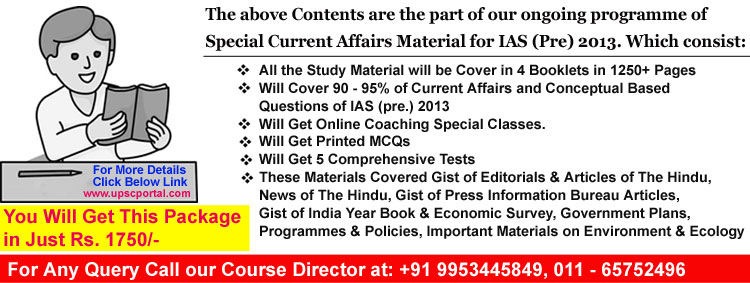(IGP) Special Current Affairs Material for IAS (Pre) 2013 - PIB "Topic : Disabled Get Social Justice"
(IGP) Special Current Affairs Material for IAS (Pre) 2013
Chapter: Gist of Press Information Bureau Articles
Topic: Disabled Get Social Justice
Q. What are the data about disabled persons in India?
- India has 2.2 crore persons with various types of disabilities as per Census 2001.
-
Among the States with large populations of persons with disabilities, Uttar Pradesh tops with 34.53 lakh, Bihar and West Bengal have over 18 lakh each, Tamil Nadu over 16 lakh, Maharashtra over 15 lakh, Madhya Pradesh and Rajasthan over 14 lakh each.
-
According to 2001 Census, 49 per cent of the persons with disabilities in the country are literate and 34 per cent are employed. Over one crore persons have visual disability, 12.61 lakh hearing and over 61 lakh have locomotor disability in the country.
- According to the NSSO Survey of 2002, 75 per cent of persons with disabilities live in rural areas.
Q. Which ministry looks after the welfare of the disables persons?
The Ministry of Social Justice and Empowerment which has the charge of looking after the welfare of the disadvantaged and marginalized sections of the society, including persons with disabilities, oversees a vast network of schemes for the empowerment and rehabilitation of persons with disabilities.
Q. National Programme for Empowerment of Persons with Disabilities?
The Government plans to consolidate schemes into a composite Centrally- sponsored national programme called National Programme for Empowerment of Persons with Disabilities in the 12th Plan (2012-2017), for their better administration.
The schemes in operation aim to promote physical, psychological, social, educational and economic rehabilitation and development of the beneficiaries to enhance their quality of life and to enable them to lead their life with dignity.
A Chief Commissioner for Persons with Disabilities has been appointed in the Ministry to receive and act upon complaints of violations of rules and orders notified for the welfare of the beneficiaries. Seven national institutes have been established to work in the field of disabilities.
Q. District Disability Rehabilitation Centres (DDRCs)?
District Disability Rehabilitation Centres (DDRCs) help voluntary organizations to run special schools for children with hearing, visual and mental disability and vocational rehabilitation centres for persons with disabilities and for manpower development in the field of mental retardation and cerebral palsy.
To facilitate creation of infrastructure at district level, the Central Government is encouraging the States in setting up of District Disability Rehabilitation Centres (DDRCs) since the ninth Plan.
A hundred DDRCs were proposed to be set up in the last two years. A total of 215 DDRCs are functioning in the country at present.
Q. Inclusive Education for Disabled at Secondary Stage (IEDSS)?
In 2009-10, the Government launched the Inclusive Education for Disabled at Secondary Stage (IEDSS), replacing the earlier Integrated Education for Disabled Children (IEDC) scheme.
This scheme provides 100 per cent Central assistance for inclusive education of disabled children studying in Classes IX-XII in mainstream government, local body and government- aided schools. The objective is to facilitate continuation of education of children with special needs up to higher secondary level.
The scheme provides for personal requirements of the children in the form of assistive devices, helpers, transport, hostel, learning material, and scholarship for the girl child up to Rs 3000 per disabled child per annum.
In addition, assistance is also provided for salary of special teachers, capacity building of teachers, making schools barrier free, establishment of resource rooms, and awareness and orientation.
Q. Rights of Persons with Disabilities Bill, 2011?
The Rights of Persons with Disabilities Bill, 2011, the proposed law that is to replace the existing Persons with Disabilities (Equal Opportunities, Protection of Rights and Full Participation) Act, 1995, is a comprehensively drafted piece of legislation that will remove the existing gaps and take care of nearly all the possible situations and circumstances in which the beneficiary population may require legal and social cover to lead a normal life.
Expanding the scope and definition of physical impairments, the 2011 Bill recognizes the equality of persons with disabilities and prohibits direct or indirect discrimination on the basis of disability. The draft law seeks to guarantee equality and non-discrimination to all persons with disabilities, and to recognize legal capacity of all persons with disabilities and make provision for support where required to exercise such legal capacity.
Q. UN Convention on the Rights of Persons with Disabilities?
India has ratified the UN Convention on the Rights of Persons with Disabilities (UN CRPD) and undertaken the obligation to ensure and promote the full realization of all human rights and fundamental freedoms for all Persons with Disabilities without discrimination of any kind on the basis of disability.
While the existing Act provided for an impairment-based exhaustive definition of disability, the UN Convention recognized that disability was an evolving concept. People with impairments, not expressly mentioned in the Act, were often denied the rights and entitlements recognized in the Act.
Accessibility for persons with disabilities was also one of the core provisions of the UN Convention on the Rights of Persons with Disabilities, which came into force in May, 2008. The Constitution of India includes persons with disabilities generically within the universal categories of person and citizen; it does not even mention disability specifically.

